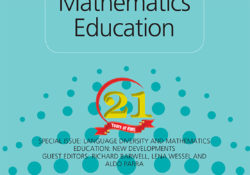tandfonline.com har udgivet en rapport under søgningen “Teacher Education Mathematics”: ABSTRACT ABSTRACT A political epistemology that enables us to determine if political actors are likely to know what they need to know must be rooted in an ontology of the actors and of the human objects of their knowledge; that is, a political anthropology. The political anthropology developed in Power Without Knowledge envisions human beings as creatures whose conscious actions are determined by their interpretations of what seem to them to be relevant circumstances; and whose interpretations are, in turn, determined by webs of belief built from somewhat heterogeneous streams of incoming ideas. This anthropology, then, has two components. Ideational heterogeneity undermines the aspiration of technocracy to predict human behavior and the aspiration of social science to arrive at lawlike… Continue Reading →
Like this:
Like Loading...
tandfonline.com har udgivet en rapport under søgningen “Teacher Education Mathematics”: ABSTRACT ABSTRACT This paper starts with an evaluation of three common arguments against pluralism in economics: (1) the claim that economics is already pluralist, (2) the argument that if there was the need for greater plurality, it would emerge on its own, and (3) the assertion that pluralism means ‘anything goes’ and is, thus, unscientific. Pluralist responses to all three arguments are summarized. The third argument is shown to relate to a greater challenge for pluralism: an epistemological trade-off between diversity and consensus that suggests moving from a discussion about ‘pros’ and ‘cons’ towards a discussion about the adequate degree of plurality. The paper shows how the trade-off originates from two main challenges: the need to derive adequate quality criteria… Continue Reading →
Like this:
Like Loading...
tandfonline.com har udgivet en rapport under søgningen “Teacher Education Mathematics”: ABSTRACT ABSTRACT What can educators working to develop critical thinking (CT) in their classrooms gain from engaging with the German/Scandinavian tradition of Bildung-centred Didaktik? This article takes up the challenge of how to develop an epistemology of CT that is relational and contextual and gives students the possibility of engaging in ethical debates about social justice, as called for by critical pedagogues such as Lim (2011, 2015). The backdrop is an increasing focus on CT as a prominent educational goal in the Organisation for Economic Co-operation and Development and beyond, a development that makes it important to clarify the epistemological basis for how CT can be developed in schools and the ethical foundations and implications of the different approaches in… Continue Reading →
Like this:
Like Loading...

tandfonline.com har udgivet en rapport under søgningen “Teacher Education Mathematics”: ABSTRACT ABSTRACT Recently the prevailing language-as-resource metaphor has been problematised and theorised. Using the philosophical theory of inferentialism, we trace an epistemological dimension of multilingualism in mathematics education and add it to the current language-as-resource discussions. With data from two different settings—a mathematics classroom in Sweden and a workshop in an indigenous settlement in Colombia—we show that in encounters between language practices and plural mathematics, the semantic and the epistemological are two sides of the same coin. Inferentialism captures such encounters without dichotomising either languages or mathematics. We contend that epistemological issues move beyond the scope of language-as-resource approaches, but they are not paths to improving school achievement. Neither are they matters of distinguishing between formal and informal language use.… Continue Reading →
Like this:
Like Loading...



